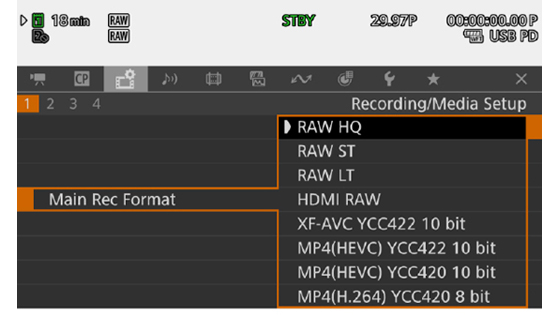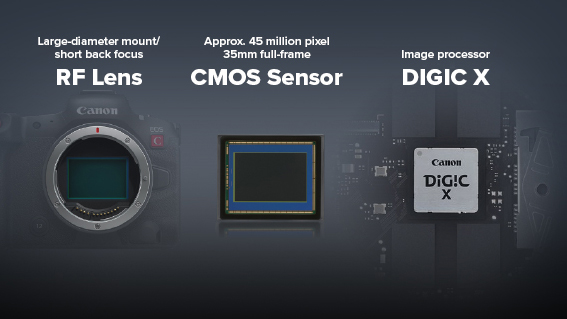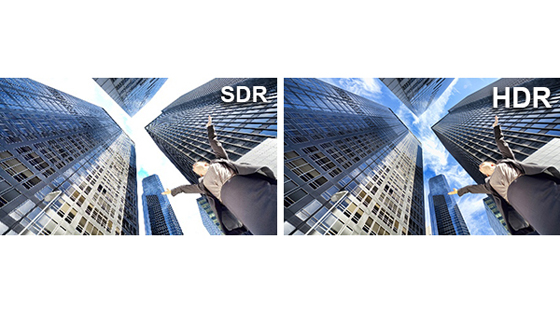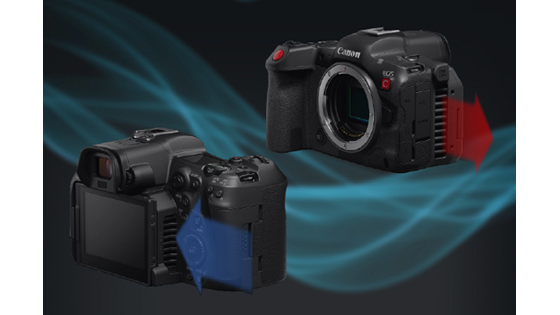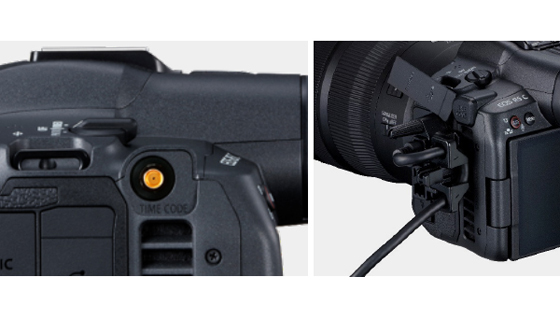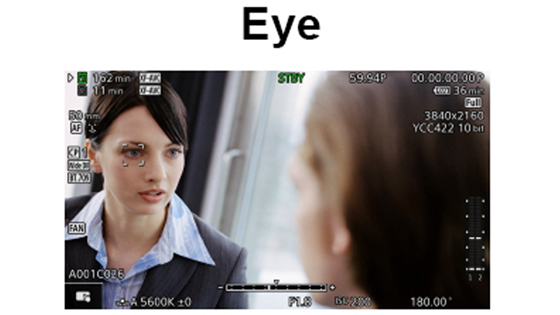For all the wedding videographers, drone camera operators, and multimedia journalists who have professional photo still and cinema video production needs, get ready for a new type of shooting experience with the
EOS R5 C Mirrorless Cinema Camera from
Canon. With a simple switch, the R5 C is a full featured still photo camera with all the settings of the R5 EOS mirrorless camera. When switched in the other direction, it becomes a full-frame 8K60 Cinema EOS camera that internally records 12-bit Cinema RAW Light footage. There's no more need to carry a second camera with you to your production when stills and video are available within a single compact design.
The R5 C enhances a number of features in comparison to its siblings the R5 and C70, including 4K120 recording, HDMI RAW output, Canon Log 3 HLG/PQ support, unlimited recording time, a timecode port, Dual Pixel CMOS AF with eye detection, an active cooling system, a high-power LP-E6NH battery, 13 reassignable buttons, and a multi-function shoe for XLR adapters. The camera also retains the reliable features of those cameras such as Wi-Fi/Bluetooth, footage compatibility with DaVinci Resolve and Canon apps, an electronic RF mount, CFexpress/SD card slots, a similar button layout, and more. The EOS R5 C is also moisture and dustproof to the same level as its cinema cousin, the EOS C70. And all this is packed into a tiny 1.7 lb body that is just asking to become your go-to drone camera.
Canon's 45MP full-frame CMOS imaging sensor is at the heart of the EOS R5 C camera's superb image quality, which also leads the way for impressive 8K60 RAW cinematic video shooting.
- Focus and speed are paramount in the EOS R5 C camera, providing impressive still-image continuous capture at speeds of up to 20 fps
- Dual Pixel CMOS AF II capability, to track split second movements of even the most elusive subjects
- With 1053 Automatic AF zones, it is easy to photograph people with the use of Eye, Face, and Head Detection AF, or intuitively track the whole body, face, or eyes of cats, dogs, or birds with Animal Detection AF
- For those with the need for speed, Canon has also included still-image vehicle subject detection to assist with accurate tracking of cars and motorcycles
- Connectivity like 5 and 2.4GHz Wi-Fi and Bluetooth is also included for the transfer of still images
The EOS R5 C camera's body design is incredibly compact and lightweight. When paired with a Canon RF lens (or EF lens using the Mount Adapter EF-EOS R), it offers outstanding performance that fits easily and comfortably in your hand, making handheld shooting a breeze whether shooting video or still images. Its electronic viewfinder is optically extended, for eye-level viewing similar to the conventional EOS R5 camera, and it uses the same ergonomic grip design.
Note:
Only Atomos NINJA V+ is supported as of January 2022. A separate HDMI cable is required to connect to the NINJA V+.
Canon's multi-function shoe with digital audio interface supports the optional TASCAM CA-XLR2d-C professional audio XLR microphone adapter for up to 4-channel audio. This optional accessory adds two full-sized XLR terminals with phantom power and shotgun mic mount, enabling digital 4-channel and 24-bit audio recording to meet professional video production needs.
The addition of Cinema RAW Light recording at higher resolutions and frame rates demands additional power for full lens functionality. In full-frame 8K60, Super 35 5.9K60, and Super 16 2.9K120 with Cinema RAW Light recording, standard LP-E6NH, LP-E6, or LP-E6N battery packs will not be able to power the electronics of RF lenses or EF lenses attached via an adapter. You can use purely mechanical lenses without issue at these settings.
To gain full electronic lens functionality with all Cinema RAW Light resolutions and frame rates, you can use utilize the CA-946 power adapter with the new DR-E6C DC coupler for mains or pro D-Tap battery power sources, or you can use a power bank such as the Anker PowerCode 26800mAh PD or omnicharge Omni Mobile 25600mAh.
The EOS R5 C camera is designed with operational flexibility in mind, conforming to each individual professional workflow, including 13 marked, assignable buttons that allow for user-friendly customized operation.
Unlike some other cameras where audio is not recorded during HFR shooting, the EOS R5 C camera can record .WAV audio as a separate file from video, virtually eliminating the need for separate audio recording and delivering HFR video and audio files in one convenient device when shooting slow motion or fast motion video.
The EOS R5 C camera features Canon Log 3, which is found in many Canon cameras and works with multiple Canon EOS and Cinema EOS cameras. The wide dynamic range can be used for a wider range of grading after shooting. Canon Log 3 is a gamma that is designed for simple grading, such as tightening dark areas and adjusting tones. It carries on Canon Log's ease of use with less noticeable noise. It can also be used when shooting with other Cinema EOS system cameras such as the EOS C300 Mark III and EOS C70 cameras.
Enhanced image stabilization is achieved through coordinated control when Canon's RF lenses with optical IS are combined with the EOS R5 C camera's electronic IS when shooting XF-AVC or MP4 formats. With an RF lens that has optical IS and the electronic IS in the EOS R5 C camera, coordinated control helps achieve the optimum hand-shake correction effects. This helps achieve better anti-vibration performance than with conventional IS-equipped EF lenses (using optional Mount Adapter EF-EOS R) and electronic IS together.
The EOS R5 C camera is an excellent camera pairing with Canon's RF5.2mm F2.8 L Dual Fisheye Lens to achieve stereoscopic 3D 180° VR video (viewing in 3D requires the use of a compatible Head Mount Display). A plug-in for Adobe Premiere Pro and Canon's EOS VR Utility are available to streamline the workflow from shooting to editing.
Still-imaging features and operation are nearly identical to Canon's EOS R5 camera. The EOS R5 C camera features the same Canon-developed CMOS sensor with approx. 45 effective megapixels, and a DIGIC X Image Processor to enhance the speed of operations across the board. This means fast, efficient performance and phenomenal image quality for big prints, impressive video, and more.
Delivering high standard and expanded ISOs (for still images), and a broad range of options to help enhance shooting in varied and fast-changing lighting situations, the EOS R5 C camera can shoot at expanded sensitivities down to ISO 50 (L) and up to 102400 (H).
- High-speed continuous shooting of up to 12 fps with Mechanical Shutter and up to 20 fps Electronic (Silent) Shutter
- High-speed continuous shooting with full AF subject detection and tracking, at all still-image quality settings
- A high-precision Dual Pixel CMOS AF system allows the EOS R5 C camera to reliably capture approximately 100% of the still-image area, with most Canon lenses
The same subject detection and tracking AF as the Canon EOS R5 Camera, even at shooting speeds as fast as 20 fps.
For still images, the same revolutionary Animal Detection AF as the EOS R5 can identify and focus upon eyes, faces, or bodies of birds, cats, and dogs, and can do so over virtually the entire image area with many Canon lenses. This opens up game-changing possibilities for wildlife images, even with subjects as challenging as birds in flight.
Carried over from the high-performance Canon EOS R3 camera, the EOS R5 C adds Vehicle Detection AF as a subject detection option, during still-image shooting. Cars and motorcycles, especially in racing applications, can be identified and tracked, even at high speeds. User-selectable Spot Detection lets the R5 C's AF detect the helmets of an exposed rider or driver, and put focus upon them, instead of the leading edge of the vehicle.
Select the size of the active AF area from a precise single AF point to the entire available AF area and rapidly move a user-selected area via the 8-way multi-controller on the back of the camera. The EOS R5 C has the same range of choices for still-image AF method selection as the EOS R5 camera.
The EOS R5 C camera features an expansive focus area of approximately 100% horizontal and 100% vertical when working with select RF and EF lenses, during still-image shooting. With older EF lenses, or with EF Extender types I and II, the EOS R5 C focuses on approx. 80% horizontally and 80% vertically of the image. This means fast and impressive focusing even when composing your subject far from the center of the frame.
Great for night photography or in very low-light settings, the EOS R5 C camera's brilliant AF can operate for still images in light as dim as a light rating of EV -6 where other AF systems may fail or search. Still-image AF is possible with lens + Canon RF tele extender combinations having maximum effective apertures as slow as f/22 - meaning AF is still possible with the RF 800mm f/11 IS STM + RF 2x Extender.
Prized for its versatility, the RF 24-105mm f/4 L IS USM from Canon is a wide-angle to short telephoto zoom characterized by its constant f/4 maximum aperture. Ideal for use in nearly any shooting scenario, this zoom is benefitted by a five-stop-effective Image Stabilizer to minimize the appearance of camera shake for sharper handheld imagery. Also complementing handling is a unique customizable Control Ring, which can be configured to adjust a variety of exposure settings settings, including aperture, ISO, and exposure compensation. Benefitting image quality, the advanced optical design features a Super Spectra Coating, which helps to suppress ghosting and flare in order to improve contrast and color accuracy when working in bright and backlit conditions. Ideal for both photo and video applications, this lens also incorporates a Nano USM autofocus motor, which delivers quick, quiet, and precise focusing performance.
Standard wide-angle to telephoto zoom lens is designed for use with full-frame Canon RF-mount mirrorless cameras.
Constant f/4 maximum aperture maintains consistent illumination throughout the zoom range.
Super Spectra coating has been applied to individual elements to minimize ghosting and flare for greater contrast and color neutrality when working in strong lighting conditions.
An Optical Image Stabilizer helps to minimize the appearance of camera shake by five stops to better enable working in low-light conditions and with slower shutter speeds.
Nano USM system utilizes both a ring type USM and an STM mechanism to realize quick and accurate focusing that is also smooth and near-silent to suit both photography and video applications. This focusing system also affords full-time manual focus control when working in the one-shot AF mode.
Configurable Control Ring can be used to adjust a variety of exposure settings, including aperture, ISO, and exposure compensation.
As a member of the esteemed L-series, this lens has a weather-resistant design that protects against dust and moisture to enable its use in inclement conditions.
Rounded nine-blade diaphragm contributes to a pleasing bokeh quality.


















































